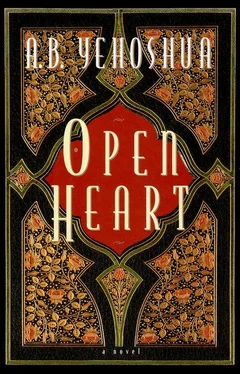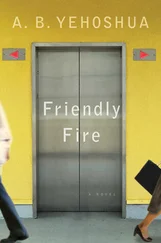A. Yehoshua - Open Heart
Здесь есть возможность читать онлайн «A. Yehoshua - Open Heart» весь текст электронной книги совершенно бесплатно (целиком полную версию без сокращений). В некоторых случаях можно слушать аудио, скачать через торрент в формате fb2 и присутствует краткое содержание. Год выпуска: 2014, Издательство: Peter Halban, Жанр: Современная проза, на английском языке. Описание произведения, (предисловие) а так же отзывы посетителей доступны на портале библиотеки ЛибКат.
- Название:Open Heart
- Автор:
- Издательство:Peter Halban
- Жанр:
- Год:2014
- ISBN:нет данных
- Рейтинг книги:3 / 5. Голосов: 1
-
Избранное:Добавить в избранное
- Отзывы:
-
Ваша оценка:
- 60
- 1
- 2
- 3
- 4
- 5
Open Heart: краткое содержание, описание и аннотация
Предлагаем к чтению аннотацию, описание, краткое содержание или предисловие (зависит от того, что написал сам автор книги «Open Heart»). Если вы не нашли необходимую информацию о книге — напишите в комментариях, мы постараемся отыскать её.
Open Heart — читать онлайн бесплатно полную книгу (весь текст) целиком
Ниже представлен текст книги, разбитый по страницам. Система сохранения места последней прочитанной страницы, позволяет с удобством читать онлайн бесплатно книгу «Open Heart», без необходимости каждый раз заново искать на чём Вы остановились. Поставьте закладку, и сможете в любой момент перейти на страницу, на которой закончили чтение.
Интервал:
Закладка:
A brief but wild scream now rose from one of the rooms, and a chorus of muttering immediately broke out from the other patients, as if they had been waiting up all night for one of their fellows to have a nightmare. The nurse cocked her head in the attentive gesture I remembered from my year in the surgical department, to see if they would all settle back down or if further intervention would be necessary. I felt a pang of pity for this hardworking woman, who as the head nurse in the surgical department had been accustomed to thinking in the drastic terms of knives and incisions, sutures and infusions and wounds to be dressed, and who now had to cope with mysterious mental illnesses by means of the little colored tablets lined up on the shelves of the cupboard behind her back. She was definitely disturbed by the freedom with which I went up to examine her stock. Although she knew that as a physician I was entitled to treat myself, she insisted that I could not take anything without the express permission of an authorized psychiatrist. In spite of this slight, I felt that she was right, for by dint of her strictness and her unimaginative honesty she was forcing me to try to calm my troubled spirit, torn between exhaustion and panic, by spiritual and not material means. For instance, a phone call to my parents, whose ability to judge my mood by the tone of my voice soon succeeded in locating the source of the pain and putting it into perspective. Even if my mother had distanced my father from me by refusing to allow him to know about my love for Dori, his natural, kindly patience could still be of value in a crisis. But it was five o’clock in the morning, and it was impossible to think of calling them before six, even if one of them happened to be awake and prowling around the house, as sometimes happened at this hour.
I said good-bye to the nurse, and to show her that I didn’t bear a grudge against her for refusing to let me help myself from the bottles of pills on her shelves, I promised to come back and visit her on one of her shifts. I returned to the main building, looking up at the cloudy sky and wondering whether Michaela too, in the heart of the desert, was searching the sky for the first stain of dawn. I went down to the intensive care unit to return my gown to its place, put on my leather jacket, and take my helmet, but instead of going upstairs I punched the code that opened the door to the surgical wing. It was a simple code, the first three even numbers, which hadn’t been changed since I started at the hospital, and it occurred to me that here was a job for the new administrative director — to change the code, because as things were there wasn’t a worker in the hospital who couldn’t open the door. As always in the hour between shifts there was no activity, but the darkness was new. The order to save electricity had succeeded in penetrating to the holy of holies of the hospital, and the operating rooms, always flooded with light coming from a separate and independent source, were all shrouded in darkness except for one little room. Although I spent a lot of time in the wing, since Lazar’s death I had not had any particular reason to visit that little room, which was full of instruments and medications used in cardiac surgery, first and foremost the cardiopulmonary bypass machine, with the white plastic tubes dangling from it like a great octopus’s arms. It wasn’t the big machine that attracted my attention, however, but the cupboard of anesthetics, most of which I knew not only by name and function but also by their pharmacological composition. With a giggle I thought of the strict nurse, who had refused to give me one little tranquilizer from her stock, whereas I was now standing before a cupboard full of powerful, expensive drugs, and without asking anyone’s permission, on my own initiative, I could easily prepare a little cocktail that I could inject into my vein and that would soon put me completely to sleep: a sleep without sensation, without consciousness, without movement or dreams. A sleep from which nothing would wake me.
But strangely enough, as I stood alone in the dark, empty surgical wing among dozens of sophisticated instruments capable of taking a man apart and putting him together again in an improved version, I felt none of the panic and anxiety that had interrupted my sleep and sent me rushing out of the house. It was as if what threatened me were connected not to the outside world but to what lay within the familiar walls of my own house, which had been abandoned by those closest to me. Was it possible that my love sought to embrace both the woman herself, and her inability to stay by herself, for fear of something that might be without form or shape but was sexual and infinitely malevolent in its intentions, not only hiding in the little storage space near the bathroom or the dark corner next to the kitchen where the brooms were kept but spreading through the little spaces between the closet shelves, pervading the drawers with the socks and underwear with a musty, invisible smell, until they turned to spiderwebs and skeins of dust underneath the bottom drawers where she kept her high-heeled shoes? Was this the smell she tried to sniff out in the hotel rooms where it was proposed that she should sleep? And suddenly this surprising new understanding of what was happening to me cheered me up so much that I switched off the light and left the surgical wing without taking a single drop of a sedative or analgesic or muscle relaxant, because I didn’t want anything material and external to calm my spirit, just the belief that whatever was disturbing me tonight would in the end strengthen me in my efforts to get closer to her and engulf her totally now that I was free of the yoke of my little family. On my way home I turned into the broad avenue next to her house in order to make sure that Lazar’s big car was parked in its usual spot, under the pillars of the building. I didn’t get upset when I spied an unfamiliar little car blocking its exit, because a little bit of imagination was all it took to realize that they must have bought it for the soldier, to make it easier for him to come home every night to be with his mother.
The minute I walked into my apartment, I could feel the agitation of abandonment stirring again in the ruins of my exhausted soul, as if only here, between these walls, this familiar furniture, lay the real world, substantial and secret, which immediately exposed one’s weakness and inability to remain and contend with it alone. Although the hands of the clock had not yet reached six, I didn’t want to wait and I phoned my parents to tell them the story of my parting from Michaela and Shivi and at the same time receive an encouraging word. My father was the one who picked up the phone, and he also conducted the conversation with me, asking questions and demanding details. He did not seem able or willing to give me any encouragement or comfort, for he more than anyone felt the loss of Michaela and Shivi, as if all the progress I had made in the past two years had gone down the drain with their departure. The rustle and echo accompanying the conversation told me that my mother was listening in on the phone next to her bed, but to my surprise she did not join in, as if she didn’t want to talk to me. I knew that her anger was deeper than my father’s, and also more justified, but her silence began to worry me, and when I felt that my father was about to bring the conversation to a close, I asked to talk to her. She interrogated me dryly and even coldly about where I was calling from, if I was at the hospital or at home. When I told her that my shift only began at noon, she wanted to know why I was calling so early. Did I wake up early, or couldn’t I fall asleep? “Both — I woke up and I couldn’t fall asleep,” I explained, and I told her a little about my night of wandering and added, “I seem to be having difficulty in getting used to staying by myself again.” For some reason a silence now fell in Jerusalem, and I heard the sound of my father putting his receiver down, as if now that my mother had taken over the conversation, he could express, in his shy but decisive way, his disapproval of me, for he never cut short a telephone call with me of his own volition. Then my mother’s voice softened a little, as if she too had understood the meaning of my father’s action, and she asked if I meant to come to Jerusalem for the weekend. When I said yes, she asked me not to use the new motorcycle but to come up by bus, as if the separation from Michaela had made my existence more dangerous and vulnerable. “And if you want to visit your friends, you can use your father’s car,” she added to encourage me to agree, and quickly put the phone down, as if from the distance she could feel me trembling on the brink of sleep.
Читать дальшеИнтервал:
Закладка:
Похожие книги на «Open Heart»
Представляем Вашему вниманию похожие книги на «Open Heart» списком для выбора. Мы отобрали схожую по названию и смыслу литературу в надежде предоставить читателям больше вариантов отыскать новые, интересные, ещё непрочитанные произведения.
Обсуждение, отзывы о книге «Open Heart» и просто собственные мнения читателей. Оставьте ваши комментарии, напишите, что Вы думаете о произведении, его смысле или главных героях. Укажите что конкретно понравилось, а что нет, и почему Вы так считаете.












